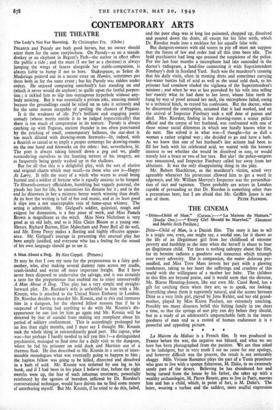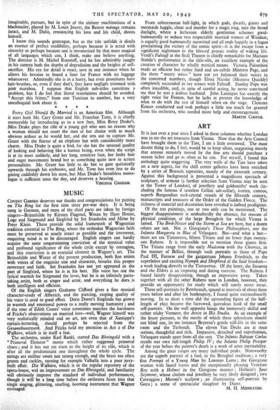THE CINEMA
" Ditte—Child of Man." (Curzon.)—" La Maison du Maltais." (Studio One.)—" Every Girl Should be Married." (Gaumont and Marble Arch Pavilion.)
Ditte—Child of Man, is a Danish film. The story it has to tell is a tragic one, even, one might say, a sordid one, for it shows us the life of an illegitimate girl from her childhood of extreme poverty and hardship to the time when she herself is about to bear an illegitimate child. Yet there is nothing unhappy about this film, for its heroine radiates a goodness and innocence which triumph over every adversity. She is compassion, the mater dolorosa per- sonified, and Miss Tove Macs invests her part with a glowing tenderness, taking to her heart the sufferings and cruelties of this world with the willingness of a mother her babe. The children in this film are beyond praise, and it would seem that the director, Mr. Bjame Henning-Jensen, like our own Mr. Carol Reed, has a gift for catching them when they are, so to speak, not looking. Everything about them is supremely natural, and the scenes between Dine as a very little girl, played by Jette Kehlet, and her old grand- mother, played by Miss Karen Poulsen, are extremely touching. Possibly too many disasters befall this fishing family in too short a time, so that the springs of our pity run dry before they should, but as a study of an adolescent's unquenchable faith in the innate goodness of man and as a record of human endurance it is a powerful and appealing picture.
* * *
La Maison du Maltais is a French film. It was produced in France before the war, the negative was blitzed, and what we see here has been photographed from the positive. We are thus asked to be indulgent, but in very truth I see no cause for any apology, and however difficult was the process, the result is not noticeably shaggy. Mlle. Viviane Romance plays the part of a Tunis prostitute who goes to live with a sponge fisherman, M. Dalio, in an extremely sandy part of the desert. Believing he has abandoned her and being turned from the house by his father, she takes up with a wealthy archaeologist, M. Pierre Renoir, goes to live in Paris, marries him and has a child, which, in point of fact, is M. Dalio's. The latter, wearing a turban and the saddest, most soulful expression
imaginable, pursues, but in spite IA the sinister machinations of a blackmailer, played by M. Louis Jouvet, the Renoir ménage remains intact, and M. Dalio, renouncing his love and his child, shoots himself.
I know this sounds grotesque, but as the tale unfolds it distils an essence of perfect credibility, perhaps because it is acted with sincerity or perhaps because one is mesmerised by that most magical of all languages which can, I chink, make one believe anything. The director is M. Michel Koustoff, and he has admirably caught in his camera both the depths of degradation and the heights of self- sacrifice. His eye for detail is exact, save in one instance when he allows his heroine to board a liner for France with no luggage whatsoever. Admittedly she is in a hurry, but even prostitutes have hair-brushes, or, even if they don't, they have negliges trimmed with pink marabou. I suppose that English sub-titles constitute a problem, but I do feel that literal translations should be avoided. "Accept this fritter," from one Tunisian to another, has a very uncolloquial look about it.
Every Girl Should Be Married- is an American film. Although it stars both Mr. Cary Grant and Mr. Franchot Tone, it is chiefly memorable for introducing us to a new face, Miss Betsy Drake's. Miss Drake plays the role of a young girl who sees no reason why a woman should not court the man of her choice with as much obvious ardour as he would her, and she sets out to capture Mr. Grant with the finesse of an elephant but with considerably more charm. Miss Drake is quite a find, for she has the unusual quality of looking and behaving like a human being, even when the script is at its most unlikely, and her long, sensitive face, her lanky hair and eager movements brand her as something quite new in screen personalities. Mr. Grant has little to do but to gaze quizzically upwards through his eyebrows, and Mr. Tone has even less to do gazing caddishly down his nose, but Miss Drake's breathless mono- logue is sufficient unto the day, and deserves a hearing.
VIRGINIA GRAHAM.











































 Previous page
Previous page